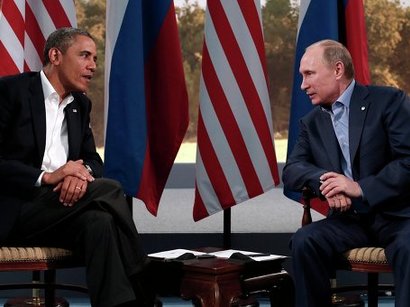U.S., Russia upbeat on Iran’s nuclear program after Rohani’s election win

By Sara Rajabova
The United States and Russia share the optimism that the dispute over Iran's nuclear program will be resolved under the administration of newly elected Iranian President Hassan Rohani, who will take office in August.
In a Monday meeting with Russian President Vladimir Putin in Northern Ireland, US President Barack Obama said he and Putin shared "cautious optimism" on the issue and expressed hope that under the new president of Iran all the parties concerned would have an opportunity to "move forward with dialogue," Press TV reported.
President Putin voiced Moscow's readiness to contribute to the negotiation process over the Iranian nuclear energy program both on bilateral and international levels.
However, in an interview with Public Broadcasting Service (PBS) anchor Charlie Rose, Obama said the U.S. and its allies would be willing to hold talks with Iran over its nuclear program as long as Tehran recognized that international sanctions would not be lifted unless Iran proved it is not building a nuclear weapon, Reuters reported.
Meanwhile, Iran's new president Rohani said during a press conference that the sanctions against Iran are brutal.
The Iranian nation has done nothing wrong and Iran's nuclear program is in line with international law, he said.
Rohani also said his government will boost mutual trust between Iran and other countries.
Western countries and some of their allies have accused Iran of pursuing non-civilian objectives in its nuclear energy program. Iran has strongly rejected the allegation, arguing that as a committed signatory to the Non-Proliferation Treaty (NPT) and a member of the International Atomic Energy Agency (IAEA), it is entitled to use nuclear technology for peaceful purposes.
Speaking about direct talks with the U.S, Rohani set three conditions for negotiating.
"First of all, the Americans have to say that they will never interfere in Iran's internal affairs. Second, they have to recognize all of the Iranian nation's due rights including nuclear rights, and third, they have to put aside oppressive policies towards Iran," he said.
Rohani won just over 50 percent of the votes in last week's presidential election, allowing him to avoid a run-off. More than 72 percent of the country's 50 million eligible voters had turned out to cast their ballots.
Rohani, 64, served in parliament from 1980 until 2000, when he became a member of the Assembly of Experts, the body that oversees the work of Ayatollah Ali Khamenei. He also served as secretary of the Supreme National Security Council from 1989 to 2005.
Here we are to serve you with news right now. It does not cost much, but worth your attention.
Choose to support open, independent, quality journalism and subscribe on a monthly basis.
By subscribing to our online newspaper, you can have full digital access to all news, analysis, and much more.
You can also follow AzerNEWS on Twitter @AzerNewsAz or Facebook @AzerNewsNewspaper
Thank you!
